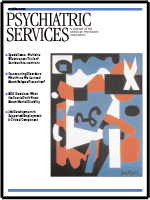Special Section on Relapse Prevention: A Focus Group Analysis of Relapse Prevention Strategies for Persons With Substance Use and Mental Disorders
Abstract
OBJECTIVE: The authors conducted a qualitative, thematic analysis of focus group data to determine the strategies and supports persons with dual diagnoses rely on in their relapse prevention efforts. METHODS: Data from four focus group sessions conducted at a large psychosocial rehabilitation center were analyzed for recurrent responses about what was most helpful in maintaining remission and grouped into major categories and subcategories. Each focus group comprised four to nine consumers who had been in remission from substance use for at least six months. A total of 27 consumers participated in the focus groups. RESULTS: The data indicate that maintaining stable housing, relying on "positive" social support, engaging in prayer or relying on a "higher power," participating in a meaningful activity, and thinking differently about life are important strategies for consumers in their attempts to stay clean. Just as frequently mentioned in the groups were conscious attempts to eat regularly, get sufficient sleep, and look presentable. CONCLUSION: Although this study was exploratory in nature, it identified areas for further qualitative study of strategies for relapse prevention among persons with dual diagnoses.



